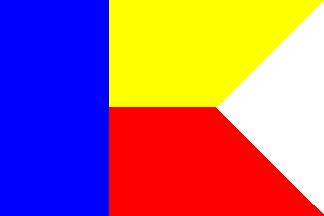
Last modified: 2003-12-20 by jarig bakker
Keywords: dunajska streda |
Links: FOTW homepage |
search |
disclaimer and copyright |
write us |
mirrors
 submitted by Rob Raeside, 17 July 1999
See also:
submitted by Rob Raeside, 17 July 1999
See also:
Dunajská Streda (Hungarian: Dunaszerdahely) has 23.236 inhabitants (83,3%
Hungarian; 1990 census). The town was in the Pozsony (in Slovakian: Prešporok)
County of the Kingdom of Hungary to 1919/1920 (Czechoslovakian occupation
/ Treaty of Trianon). 1920-1938 part of Czechoslovakia, 1938-1944 part
of Hungary (after the Decision of Vienna). The Treaty of Paris (1947) reallocated
it to Czechoslovakia. The city is birthplace of the famous Hungarian Central
Asian traveller Ármin Vámbéry (1832-1913).
István Molnár, 12 Jun 2000
![[Dunajská Streda 1979 flag]](../images/s/sk-ds79.gif) by Jan Kravcik, 13 June 2000
by Jan Kravcik, 13 June 2000
The flag of Dunajská Streda in 1979. Blue symbolizes the river Danube
(Dunaj), yellow stands for the colour of wheat (Dunajská Streda is located
on the so-called Rye Island) and red represents the full municipal rights
which were granted to the city in 1960. The flag was created by dr. P.
Püspöki Nagy in 1969.
Source: 'Klíc k našim mestum' by Karel Liška and Ludvík Mucha,
ed. Práce in Prague, 1979 and 'Városaink neve, címere és lobogója'
by S. Széll, Budapest 1941.
Jan Kravcik, 13 June 2000
![[Dunajská Streda long flag]](../images/s/sk-ds-01.gif) image from this
site, reported by István Molnár, 2 Nov 2000
image from this
site, reported by István Molnár, 2 Nov 2000
The colours of the flag of the town are given by the colours of the
towns coat of arms. Therefore the colours of the coat of arms must appear
on the flag according to their arrangement in the coat of arms in the following
order: blue, gold, red. This is the authentic form of Dunaszerdahelys
flag: The height of the flag is the half of its length. The first third
of the field on the right /by the rod/ is blue along the whole height of
the flag. The further two thirds are gold in the upper and red in the lower
half with the division along the lengthwise axis. The flag of the town
is used on special occassions; national holidays, local festivals and larger
cultural events.
Info from this
site.
dunaj.gif) from http://www.tatrahome.sk/revue/erby/ . (!Link does not work any more!)
from http://www.tatrahome.sk/revue/erby/ . (!Link does not work any more!)